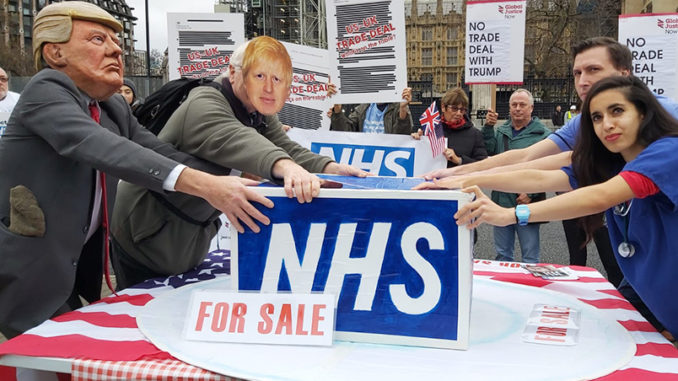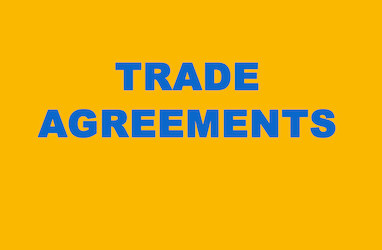
This article was originally published in The Lowdown, an online magazine for health campaigners.
● The new Trade Bill gives Parliament little say over future trade deals according to MPs and campaigners, but the government says it’s just a technical bill.
● The Trade Bill does not exclude the NHS and other public services from future trade negotiations.
● The views of Wales, N Ireland and Scotland about future trade deals could be sidelined.
● Since the election the government has reverted to a stripped back version of the Trade Bill dropping previous checks and balances.
Why is the Trade Bill needed?
Now we are no longer part of the EU, the Government’s Trade Bill is needed to enable ministers to implement existing trade deals. Originally negotiated by the EU these deals will be rolled over, at the end of the transition period. The bill also enables the UK to run its own trade policy and the government highlights the need to defend UK industry from issues like the dumping of cheap goods; and the bill establishes a new quango, the Trade Remedies Authority to take on this work.
What the Trade Bill will allow the government to do?
The Trade Bill will allow the Government to extend existing trade deals, negotiate changes to any existing deals and set up new deals. However, the Bill has ditched the amendments that were made to it before the election, responding to criticisms that the Bill offered no process for Parliament to properly scrutinise or object to future trade deals.
The government claims that its Trade Bill is only concerned with the EU trade deals that have already been ratified, saying that ‘translating’ these deals into UK deals post-Brexit is just a technical exercise. Therefore, Parliament’s role is unimportant in this process as scrutiny has already taken place, both at EU level and via the EU Scrutiny Committee.
However, this is not totally true as the Trade Bill also covers negotiations and trade deals with countries seeking to alter the previous EU deal and those seeking to negotiate new deals.
A case in point, negotiations between the USA and UK over a post-Brexit deal have already begun and negotiations for this deal would be covered by the Trade Bill.
Why are campaigners concerned about the Trade Bill?
The main points that concern campaigners are 1) the lack of provision for Parliament to scrutinise and reject any trade deals, 2) the inclusion of some sweeping powers to change primary legislation, and 3) the fact that the NHS is not excluded from trade deals. There are also issues with how it impinges on the devolved nations – Scotland, Wales and Northern Ireland.
Scrutiny and a vote
The scrutiny of trade deals while we were members of the EU, was delegated to European Institutions and the UK EU Scrutiny Committee. Critics believe a new Trade Bill should include provisions for adequate scrutiny of negotiations and trade deals by Parliament.
UK rules for negotiating on trade do exist, but are decades old and are regarded as unfit for the contemporary challenges of reaching new deals with the USA or China.
David Lawrence a senior political advisor at the Trade Justice Movement, a network of 60 civil society organisations campaigning for trade rules, believes that currently:
“Our elected representatives will struggle to stop a bad US trade deal, even if it were roundly unpopular and known to be harmful”
Under the proposals, there is no requirement to consult the public and virtually no role for Parliament until after the deal is signed. At the very end of the process, Parliament is asked to ratify the deal in a procedure dating from the 1920s which is outlined in the Constitutional Reform and Governance Act 2010.
The use of this Act can be tricky as it relies on sufficient time being allotted to the opposition for discussion of the deal.
Under the rules, Whitehall (the Government) is able to decide when and who to start negotiations with, decide its own priorities and objectives, conduct negotiations, usually in great secrecy, and conclude and sign the eventual deal.
The Institute for Government concludes:
“The current arrangements give Parliament a limited role. It can vote to delay the ratification of trade deals, or could prevent them being implemented by voting against changes to tariff rates or regulation. However, given the potential economic and policy implications of future trade deals, government should guarantee Parliament a direct vote on any future deals before they are ratified.”
Talks between the USA and UK, already underway, are not subject to scrutiny and the Trade Bill in its current form will mean that they continue to be conducted in secret with little Parliamentary or public involvement.
Campaigners want the Trade Bill to be amended to make it a requirement to update Parliament on what is going on and to conduct negotiations openly and transparently. To be meaningful scrutiny must include, they say a Parliamentary vote to approve any new trade deals.
Sweeping powers
The Trade Bill also provides the Government with the authority to amend primary law for the implementation of an international trade agreement. These changes could have a major impact on fundamental rights and consumer protections across a number of areas of society. For example, if the international trade deal asked for the lowering of food or farming standards.
Inclusion of the NHS
The Trade Bill does not specifically exclude any area of public services, including the NHS from negotiations, such as those with the USA.
The NHS could be left out if trade negotiators agreed to use an approach known as positive listing for services which means that only the named services would be included in a trade deal and everything else is off the table.
Of course, the government claims there is no need for such a provision as “The NHS is not, and never will be, for sale to the private sector, whether overseas or domestic.”
However despite this denial, in November 2019 leaked trade papers from the US/UK negotiations showed that the US is demanding a negative listing system which works the opposite way – all services are on the table unless specifically exempted. Protection for public services is a lot harder to work this way, as every single service has to be listed in detail and then exempted.
The organisation Global Justice Now points to a more secure way to exclude the NHS through a broad watertight carveout for public services, based on the definition by the European Public Services Union, effectively excluding the NHS (and other public services) from the trade deal.
NHS campaigners see significant threats if the NHS stays on the table. It is not widely recognised that US firms already have access to NHS contracts through the current tendering system, but US firms would seek other market advantages, like the strengthening of intellectual property rights for companies who hold patents and data about the drugs they market, which could delay patient access to cheaper generic drugs.
They would likely push for access to the British NHS’s unique database of 55 million patient records, which have been estimated to be worth £5 billion per year to private companies. Consultancy.uk has highlighted a recent paper from professional services giant EY which claims that the NHS could tap into a vital source of funding by opening up its patient records to private entities.
The bills impinge on the powers of the devolved administrations
These are all UK bills – but they all impinge on the powers of the devolved administrations. The UK government enacted the Withdrawal Agreement Bill (WAB) despite all the devolved legislatures refusing legislative consent – the first time that has ever happened. Campaigners and MPs in these nations are almost certainly going to oppose this bill as well.
What stage has the bill got to in Parliament?
The Government published the Trade Bill just a few days before Parliament rose early to allow MPs to leave Parliament and self-isolate in their constituencies. The Bill was given its first reading on 19 March and as with all Bills at this stage it was passed. The Bill is now awaiting its second reading, with a date yet to be announced. However, with the return of Parliament as a virtual entity on 21 April, this bill is likely to begin its second reading very soon.
This is the second time out for the Trade Bill – the original trade bill was put to Parliament in 2017. It reached a third reading in The House of Lords on 20 March 2019. The Bill faced many amendments and the session ended before it received approval.
What are campaigners doing?
The main focus of campaigners is the negotiations between the USA and UK. The Government announced in mid-March 2020 that it is committed to restarting negotiations as soon as possible. These will be conducted in secrecy and will not be subject to any scrutiny if the Trade Bill in its current form is passed by Parliament. On 23 March 2020, 17 organisations signed a letter to the Prime Minister and Secretary of State for International Trade, urging the government to delay negotiations and calling for proper Parliamentary and public scrutiny.
“These are high risk issues that need considered public debate and democratic scrutiny, but this debate cannot happen amidst national lockdown and with Parliament closed. Outside of a time of crisis, when the government has the time and resources to dedicate to negotiations, we expect full public and Parliamentary engagement with appropriate scrutiny and transparency throughout the process.
We call on the government to pause all trade negotiations until the Covid-19 crisis is under control and to inform both the public and potential trade partners of this necessary action.”
Glenrothes SNP MP Peter Grant has tabled a private members bill – The Trade Agreements (Exclusion of National Health Services) Bill – that seeks to exclude the NHS from trade deals and say that explicit consent of the Scottish, Welsh and Northern Irish Parliaments and Assemblies is required on any trade deals. This is heading for its second reading in Parliament in October 2020.
Global Justice Now has a petition opposing any US -UK trade deal that lowers UK food standards, opens the NHS and other public services up to US corporations, or gives more powers to corporate courts. The petition also calls for greater transparency and a meaningful vote on future deals for MPs. To sign, visit the Global Justice Now website.






Leave a Reply